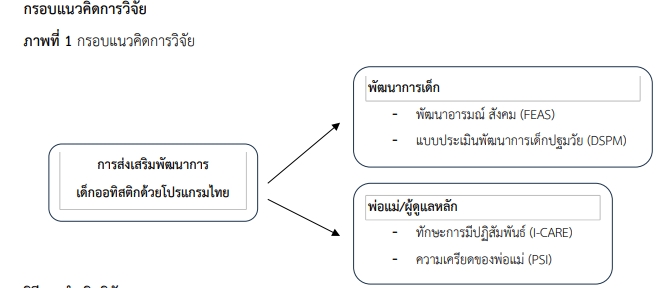ผลของโปรแกรมไทยต่อการส่งเสริมพัฒนาการเด็กออทิสติก โรงพยาบาลสมเด็จพระยุพราชท่าบ่อ จังหวัดหนองคาย
คำสำคัญ:
ออทิสติก, ไทยโมเดล, พัฒนการเด็ก, พัฒนาการอารมณ์สังคมบทคัดย่อ
การศึกษานี้เป็นการวิจัยกึ่งทดลอง (Quasi-Experimental Research) แบบวัดกลุ่มเดียวก่อน และหลังการทดลอง มีวัตถุประสงค์เพื่อเพื่อศึกษาประสิทธิผลของการส่งเสริมพัฒนาการเด็กออทิสติกด้วยโปรแกรมไทย โดยเปรียบเทียบจากการเปลี่ยนแปลงของพัฒนาการอารมณ์ สังคมของเด็กออทิสติกเด็ก และการเปลี่ยนแปลงของพ่อแม่/ผู้ดูแลก่อนและหลังใช้โปรแกรมไทย กลุ่มตัวอย่างเป็นครอบครัวของเด็กออทิสติกที่มารับการรักษาที่โรงพยาบาลสมเด็จพระยุพราชท่าบ่อ จำนวน 5 ครอบครัว คัดกรองกลุ่มตัวอย่างโดยเลือกกลุ่มตัวอย่างแบบเฉพาะเจาะจง สำหรับโปรแกรมไทยประกอบด้วย 1) กิจกรรมห้องเรียนพ่อแม่ 2) กิจกรรมส่งเสริมพัฒนาการเด็กและฝึกสอนพ่อแม่ 3) การส่งเสริมพัฒนาการเด็กที่บ้านด้วยโปรแกรมไทยโดยพ่อแม่หรือผู้ดูแลหลัก ส่วนเครื่องมือสำหรับวัดผลการวิจัย ได้แก่ 1) แบบเก็บข้อมูลพื้นฐาน 2) แบบประเมินพัฒนาการอารมณ์ สังคม (FEAS) 3) แบบประเมินพัฒนาการเด็กปฐมวัย (DSPM) 4) แบบสอบถามความเครียดผู้ปกครองในการเลี้ยงดูบุตร (PSI-SF) 5) แบบประเมินทักษะการมีปฏิสัมพันธ์กับเด็ก (I-CARE) วิเคราะห์ข้อมูลด้วยด้วยสถิติเชิงพรรณนา และ Wilcoxon signed rank test
ผลการวิจัยหลังเข้าร่วมโปรแกรม พบว่า ทักษะการมีปฏิสัมพันธ์กับเด็กเพิ่มขึ้นอย่างมีนัยสำคัญทางสถิติ (Z = -2.032, p = 0.042) ในขณะที่พัฒนาการทางอารมณ์สังคม (Z = -1.214, p = 0.225) และความเครียดผู้ดูแลเด็ก (Z = -.674, p = 0.500) ไม่พบการเปลี่ยนแปลงที่มีนัยสำคัญทางสถิติ
สรุปว่าโปรแกรมไทยทำให้ครอบครัวมีทักษะการมีปฏิสัมพันธ์กับเด็กออทิสติกดีขึ้นอย่างมีนัยสำคัญ ความเครียดของผู้ดูแลหลักลดลงและพัฒนาการทางอารมณ์ สังคมของเด็กออทิสติกเพิ่มขึ้นแต่ไม่พบนัยสำคัญทางสถิติ

ดาวน์โหลด
เผยแพร่แล้ว
รูปแบบการอ้างอิง
ฉบับ
ประเภทบทความ
สัญญาอนุญาต
ลิขสิทธิ์ (c) 2024 วารสารการส่งเสริมสุขภาพและอนามัยสิ่งแวดล้อมบทความในวารสารนี้มีลิขสิทธิ์โดยและเผยแพร่ภายใต้สัญญาอนุญาต Creative Commons แบบแสดงที่มา-ไม่ใช้เพื่อการค้า-ไม่ดัดแปลง 4.0 ระหว่างประเทศ (CC BY-NC-ND 4.0)
สามารถอ่านและนำไปใช้เพื่อวัตถุประสงค์ทางวิชาการ เช่น การสอน การวิจัย หรือการอ้างอิง โดยให้เครดิตแก่ผู้เขียนและวารสารอย่างเหมาะสม
ห้ามใช้หรือดัดแปลงบทความโดยไม่ได้รับอนุญาต
ข้อความที่ปรากฏในบทความเป็นความคิดเห็นของผู้เขียนแต่เพียงผู้เดียว
ผู้เขียนต้องรับผิดชอบต่อเนื้อหาและความถูกต้องของบทความของตนทั้งหมด
การนำไปใช้ซ้ำหรือเผยแพร่ซ้ำในรูปแบบอื่นต้องได้รับอนุญาตจากวารสาร





